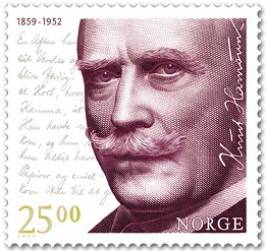Controversy has erupted after Norway issued a stamp honouring a writer who sympathised with the Nazis.
 The 25kr stamp was issued on August 4
The 25kr stamp was issued on August 4Knut Hamsun won the Nobel Prize for Literature in 1920, but met Hitler during the German occupation of Norway in 1943 and later wrote an positive obituary for him. He also encouraged Germany to ‘bring England to its knees’ in a wartime newspaper article. After the war, he was put on trial, but he was declared mentally incompetent and was fined rather than imprisoned.
Baruch Tenembaum, who runs the International Raoul Wallenberg Foundation, named after the Swedish diplomat who rescued Jews from the Holocaust, objected to the stamp, saying: ‘Celebrating the life of a Nazi, regardless of his literary merits, is despicable. Doing so through a stamp is even more obscene.
‘A stamp carries a picture, a name and a price tag. It does not come with any background information about who the man was. Millions of Norwegians will get expose to Hamsun’s stamp and the lesson they will learn is that Hamsun was a man to be worshipped. One would expect that only rol models appear on stamps. Not bigots.’
Tenembaum wrote to Norway’s government saying he was ‘astonished and concerned’. replied that the stamp ‘in no way condones Hamsun’s support for the Nazi regime. His pro-Nazi activities must continue to be condemned.’
Norway Post said: ‘There was much internal discussion before we decided to honour Hamsun’s literature with a stamp, in connection with the 150th anniversary of his birth. He is the only Norwegian writer who has won the Nobel Price for Literature and had not yet been depicted on a stamp.’
The Chief Executive of the Board of Deputies of British Jews, Jon Benjamin, said: ‘One would have hoped that the decision to include Hamsun in this issue would have been taken after discussion with all Norwegians, including Jewish ones and veterans of the fight against Nazi occupation. We are not aware of that being the case. To rehabilitate an active Nazi sympathiser, whatever his literary attributes, seems to set a dangerous precedent.’
